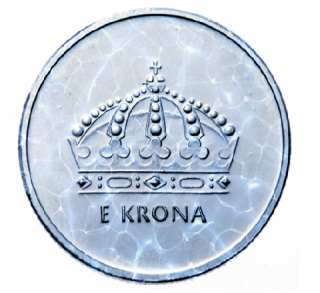
Riksbank, Sweden’s central bank, is investigating the possibility of introducing its own electronic currency, the “e-krona”.
The long-term project is in response to changing consumer habits and the digitisation of banking services.
Swedish consumers are rapidly moving away from banknotes and coins in favour of digital payments. Meanwhile, banks and an ecosystem of fintech suppliers are developing digital financial services in the region.
“We really have to take into consideration whether the decline in cash will have any effect on society, on certain groups in Sweden, on the infrastructure and also what is the effect when there is no central bank money in society,” said Eva Julin, project manager at Riksbank. “We have to think of alternatives for the central bank.”
Sweden is already largely cash-free. In 2016, only 15% of its retail payments were made in cash – down from 40% in 2010 – and some shops have abandoned cash entirely.
Riksbank’s concern is the potential vulnerability of a cashless society in case of a systemic failure, as Sweden’s digital payments market is currently in the hands of a small number of commercial players, payment services and infrastructures.
The central bank said the e-krona could act as a government-guaranteed means of payment and a digital complement to cash. It would mainly be intended for small payments between consumers and companies.
“If we introduce the e-krona, it should be accessible 24 hours a day, seven days a week, all year round,” said Julin. “It is important that the e-krona is linked directly to the central bank, so it is risk-free.”
For the Swedish public, e-krona would be available via an account or through an app or card. The latter would also enable small offline payments, which would make the digital currency more accessible for people unwilling or unable to hold an e-krona account.
The next step for Riksbank is to consider technology for the digital currency. Currently, the bank is looking into a combination of new technologies, such as distributed ledger, and more traditional methods based on central databases.
Riksbank has also invited private-sector service providers and financial companies to submit proposals on how the digital currency could be implemented. The initial plan is for the central bank to provide the basic infrastructure for the e-krona, with private-sector systems used for consumer-facing applications.
But Julin stressed this is all still part of an investigatory process started in March 2017 and no decision has yet been made to issue e-krona. The plan for this year is to create a theoretical proposal for the digital currency and next year to go into more detail about the regulatory challenges and how the system would function in practice.
“Late 2018 is the earliest our board can take some kind of a decision on whether to continue the project,” said Julin. “Then we would have a development and implementation phase. We know it can take four to five years before we can have a new system working, so this is really about the future. But that is why it is so important to start preparing now.”
About the author |
|
 |
Tom Thorp is an IT Consultant living in Miami on Queensland's Gold Coast. With more than 30 years working in the IT industry, he has extensive experience. The IT services provided to clients include:
Website development and hosting,
Database Administration, Server Administration (Windows, Linux, Apple), PBX Hosting and Administration, Helpdesk Support (end-user & technical). |
| If you like any of my content, consider a donation via Crypto by clicking on one of the payment methods:. | |




